HyperX Predator 32GB (4x 8GB) DDR4-3333 Memory Review: Optimized for Perf, Not Price
Why you can trust Tom's Hardware
Benchmark Results & Final Analysis
Rated at DDR4-3333 with 16-18-18-36 timings, the HyperX Predator kit we received already has a noticeable advantage in real-time latency compared to the XPG Sprectix DDR4-3000 using the same number of latency cycles. That’s because cycle time is the inverse of clock frequency. For the same reason, the Trident Z kit should be slightly quicker in spite of its 18-19-19-39 timings, thanks to its DDR4-3866 rating. But before we get to the benchmark charts, we really wanted to see how far down the latencies of each kit could be pushed, at various frequencies.
| Lowest Stable Timings at 1.35V (Max) on MSI Z370 Godlike Gaming (BIOS A.40) | |||
| Row 1 - Cell 0 | DDR4-3733 | DDR4-3200 | DDR4-2666 |
| HyperX Predator HX433C16PB3K4/32 (4x 8GB single-rank) | 17-19-19-38 (2T) | 15-16-16-32 (2T) | 12-13-13-28 (1T) |
| Adata XPG Spectrix D40 AX4U300038G16-QRS (4x 8GB single-rank) | X | 15-16-16-32 (1T) | 13-13-13-28 (1T) |
| G.Skill Trident Z 32GB F4-3866C18Q-32GTZ (4x 8GB single-rank) | 16-17-17-34 (2T) | 14-14-14-28 (2T) | 12-12-12-28 (1T) |
| G.Skill Trident Z 32GB F4-3000C15D-32GTZ (2x 16GB dual-rank) | X | 15-15-15-30 (2T) | 12-13-13-28 (1T) |
The timings chart above shows that the HyperX Predator was tested at a higher-than-rated data rate of DDR4-3733, but just how far could this kit be overclocked? Good news: We have a chart for that!
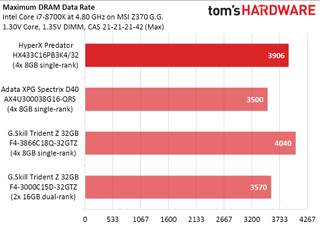
The HyperX Predator DDR4-3333 takes second place in overclocking, behind the Trident Z DDR4-3866, just as you’d expect from its second-highest rating. What’s impressive is just how closely the Kingston kit approaches that leader.

Stock memory bandwidth is helped by both frequency and latency here, since Sandra’s benchmark uses multiple packets. The HyperX Predator DDR4-3333 is always just a step behind the Trident Z’s DDR4-3866 high mark.
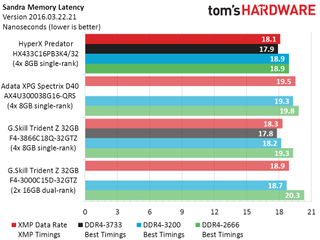
Remember when we said DDR4-3866 CAS 18 is supposed to be slightly quicker than DDR4-3333 CAS 16? Well, Sandra’s memory latency test didn’t show that. Our statement instead was based on simple calculations.
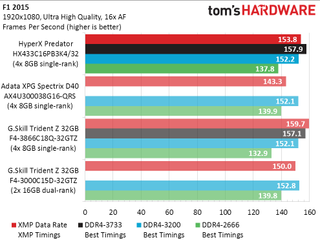
Games based on the EGO gaming engine are notoriously memory biased, and we see the HyperX Predator DDR4-3333 trading blows with Trident Z DDR4-3866 as the pair trounces the lesser kit. Yet our lower settings show that if your system is only capable of pushing DDR4-3200, the lesser kit is a safe bet.
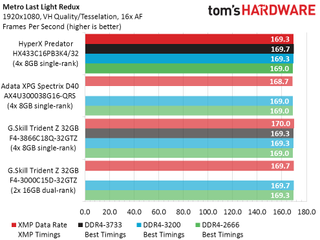
We include Metro Last Light Redux as a representation of the way most games scale with DRAM. And even though none of the compared kits here are slow enough to harm these frame rates, we’ve seen bad configurations (such as slow DDR3 and single-channel memory modes) that will hurt your gaming experience.
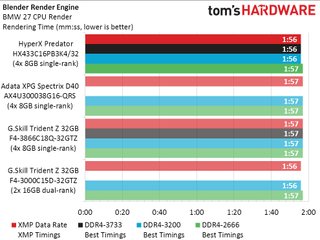
As Metro represents the performance behavior of most games, Blender represents the performance behavior of most non-gaming apps. Render times that could have been significantly lengthened by sub-par memory configurations weren’t hampered by any of the good solutions we’re comparing here.
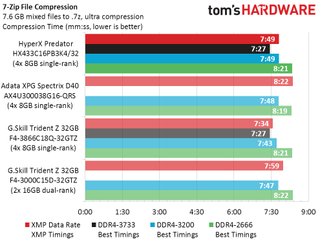
There are a few apps that really benefit from memory performance that exceeds current standards, and 7-Zip is the perfect example. We see that the best performance (shortest compression times) happens at the DDR4-3333 tests of both top kits.
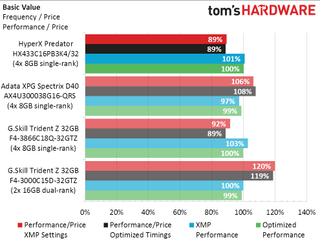
As great as the HyperX Predator DDR4-3333 appears in our benchmarks, it suffers a slight pricing problem when compared to its top competitor, the Trident Z DDR4-3866. The problem is that G.Skill cut a sweet deal with Newegg that Kingston seemingly has not yet cut with anyone. A mere 10% cut would have helped this model tremendously in the value chart, but we’re not sure if Kingston has the margins to do it.
Current buyers are still facing the 2017-era DRAM price run-up, making RAM prices high across the board. And if you're one of those desperately waiting for prices to go back down won't find a good value in the HyperX Predataor DDR4-3333 4x 8GB kit.
MORE: Best Memory
MORE: DDR DRAM FAQs And Troubleshooting Guide
MORE: All Memory Content
Stay on the Cutting Edge
Join the experts who read Tom's Hardware for the inside track on enthusiast PC tech news — and have for over 25 years. We'll send breaking news and in-depth reviews of CPUs, GPUs, AI, maker hardware and more straight to your inbox.

